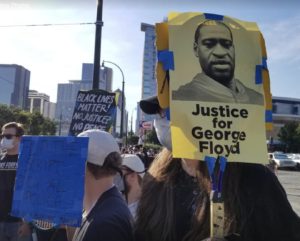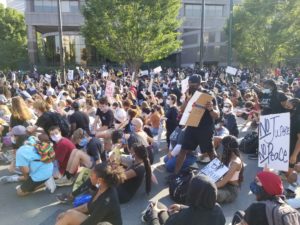I Can’t Breathe: Racial Justice and Climate
I can’t breathe. These powerful words amplify the pain of the multiple challenges we face in America today. We are witnessing the beginning of a movement, a unified desire for change that is lasting, broad, and deep. We need to find common ground to emerge from this anger, frustration, and heartbreak with positive action toward a transformation of our systems that have been built on centuries of oppression, exclusion, and racism.

Our justice system is inherently biased and must be transformed. Those responsible for the murder of George Floyd must be held accountable, police training must change, sentencing laws need reform, and we must stop the mass incarceration of people of color and people who need mental health or substance abuse treatment.
But in addition–our housing system, our taxation system, our employment system, our education system, our polluting and unsustainable infrastructure system, and our healthcare system are also broken. People of color do not receive equal opportunity or benefit from these systems. This fact is not new. What is new is that all of these systems are being challenged at once.
The killings of people of color by police or vigilantes have exposed the brokenness of our justice system. The pandemic has exposed the brokenness of our healthcare system, and our housing system at the same time. The resulting job loss has exposed the inequities in employment, taxation, education, benefits, and hourly wages. Climate impacts have exposed our unsustainable infrastructure and costly subsidizing of the harmful fossil fuel industry. Pollution has made communities of color even more vulnerable to COVID-19 and job loss, and centuries of zoning and housing policy have placed communities of color in the path of pollution, flooding, and extreme weather, and not allowed for the wealth accumulation that white communities have benefited from. My recent webcast conversation with national climate leaders Sarita Turner (Institute for Sustainable Communities) and Domingo Garcia (League of United Latin American Citizens), on Communities, Climate, Equity and Policy, underscored these challenges for communities of color.

This alignment of disasters gives us space for major, transformational and structural change. This alignment of broken lives and broken systems gives us the opportunity to build back better. America – can this spirit of cooperation, a shared sense of our common values, and recognition of our systemic racism and brokenness, last for the long term and also build something altogether new? Our local communities have the opportunity to build back better, including the voices of people of color in solutions from the beginning. Many cities are turning to a Green Stimulus to tackle unemployment by creating sustainable jobs; focusing job training on divested communities; including local voices to repair broken neighborhoods and create value with shade trees, bike lanes, and energy efficient retrofits; and more. We can transform our infrastructure to create healthy, climate-friendly, affordable neighborhoods, but we cannot do this without addressing our racial inequities. Racial justice and climate justice are integrally linked.
